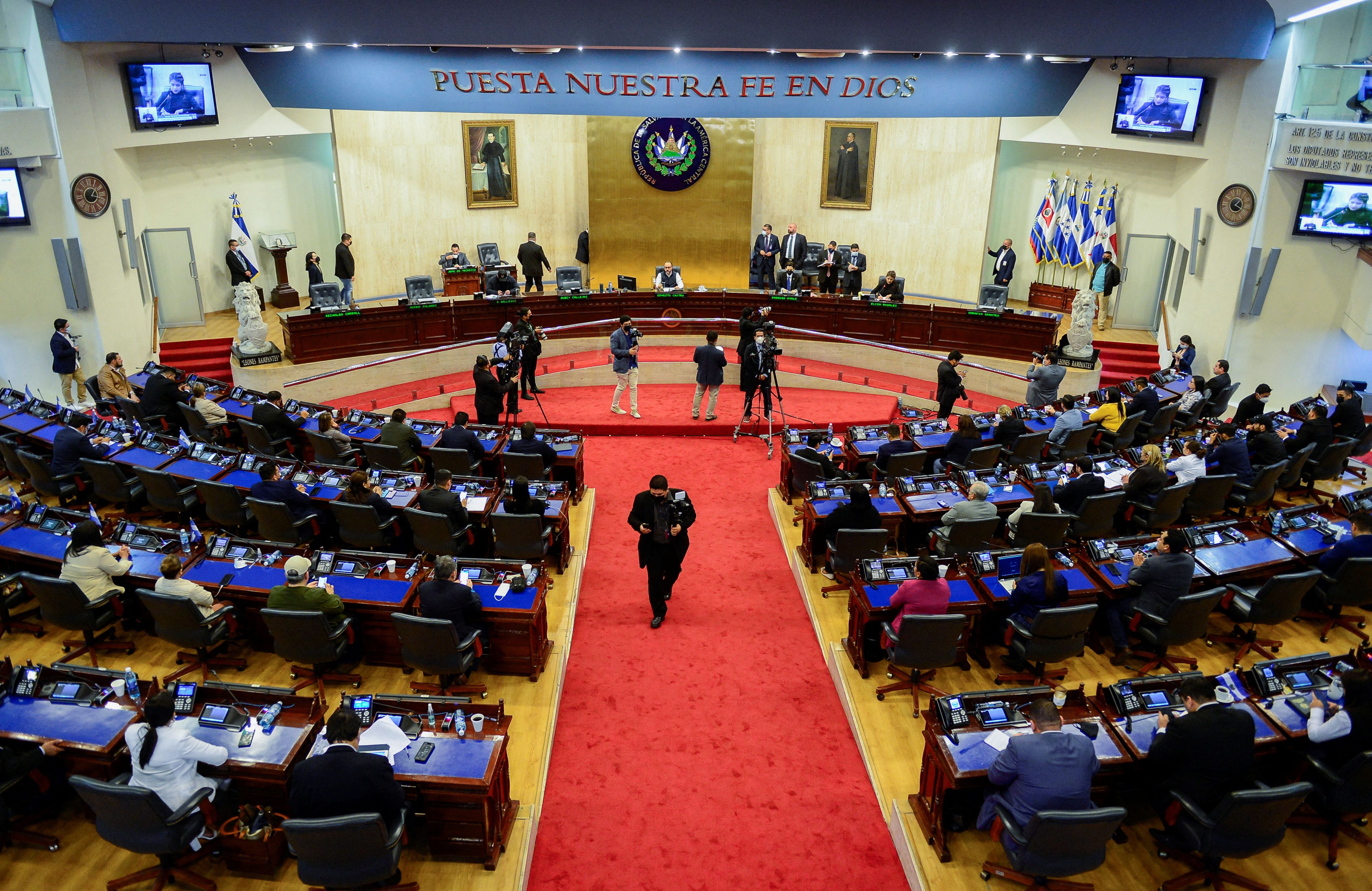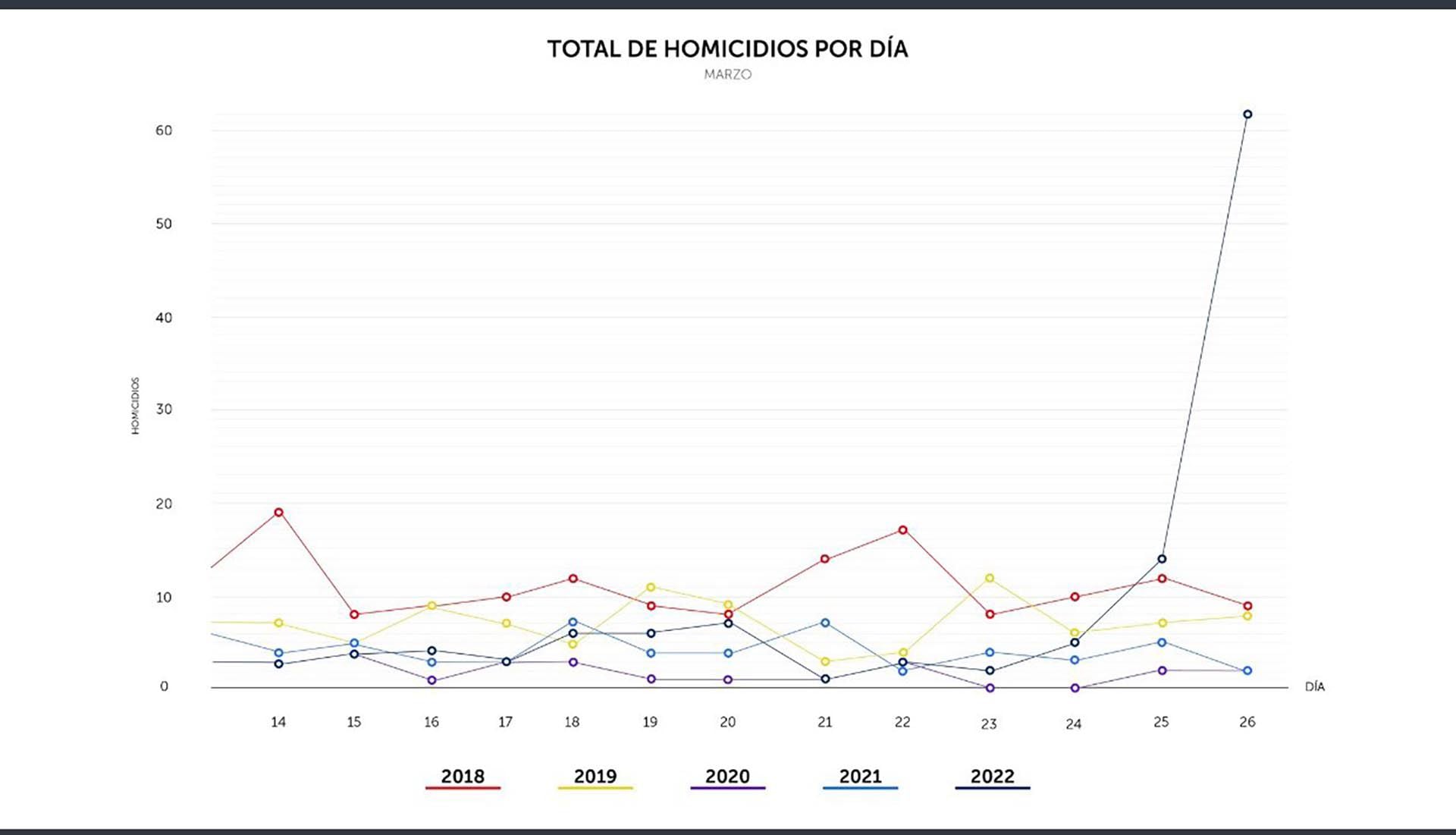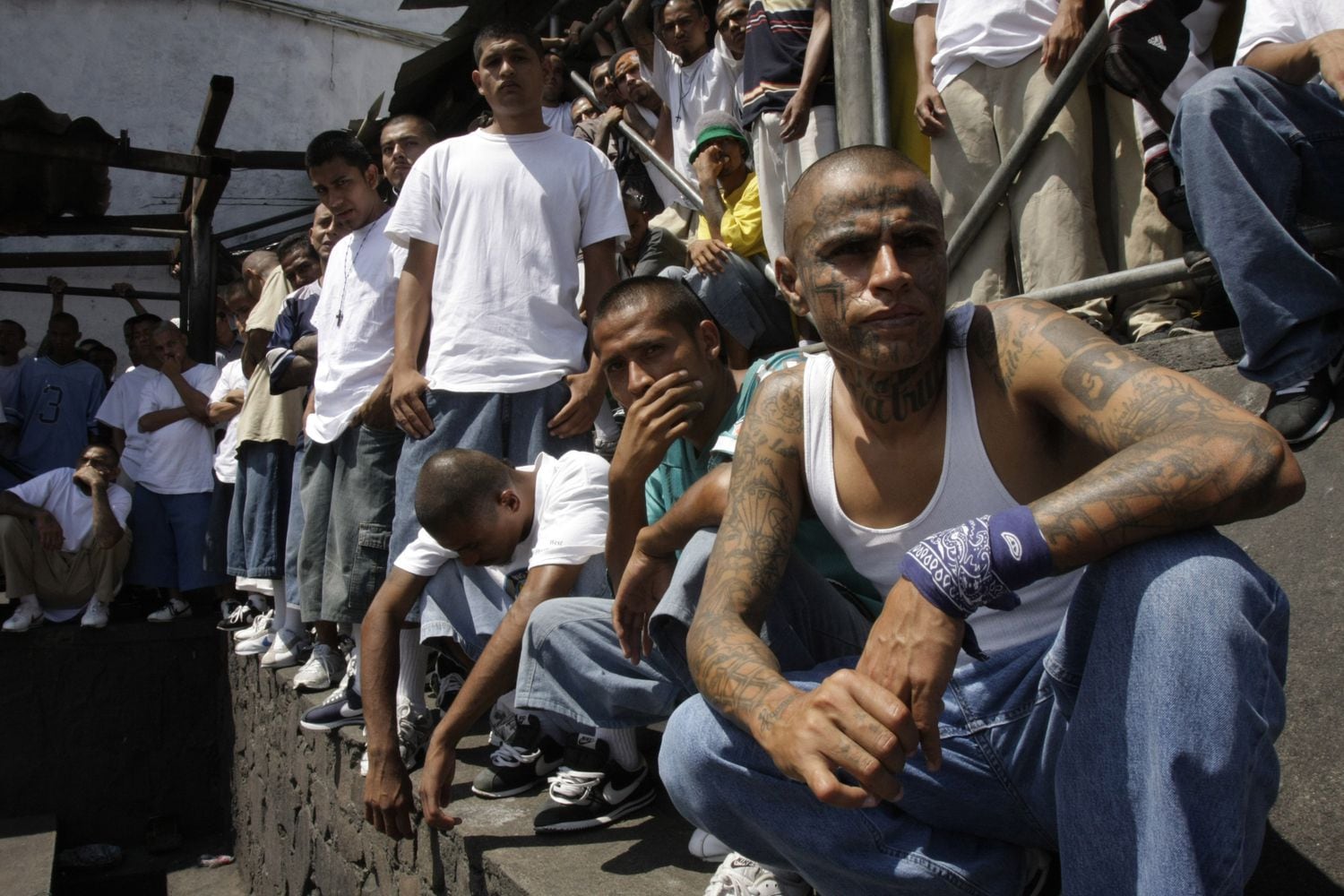
El Salvador's Legislative Assembly, controlled by President Nayib Bukele, decreed a state of emergency around 3:00 a.m. on Sunday asked by the president to, supposedly, combat an escalation in the murders that left 62 bodies in the country's streets on Saturday, March 26.
With this, the law allows the Executive to suspend for 30 days the constitutional rights to free association, to access a defence lawyer, to be brought before a judge within a period of no more than 72 hours, and allows the government to intervene without a court order emails and communications. All this in a country whose State organs and comptrolling institutions Bukele has managed without restrictions since May 1, 2021, when his party won a supermajority in the Legislative.
The state of emergency, say official propaganda, the attorney general appointed by Bukele and the president himself, will serve the Executive to “hunt” the structures of the MS13 and Barrio 18 gangs to which the majority of Saturday's murders are attributed - and whose members are among the majority of the victims - but also to whom the government understand that they finance and support them.
Most of the dead, according to officers of the National Civil Police who leaked information about the increase in homicides at noon on Saturday, were members of the gangs. When the accountant recorded 29 murders, 19 dead were from MS13 and one from Barrio 18 Sureños; the rest, according to the report, had no affiliation.
By the end of the day, the record closed with 62 homicides, well above the 20 recorded in 2014, when El Salvador was experiencing one of the most violent years of the post-war period, ended in 1992 by a peace agreement.
At 6:30 p.m. on Saturday, Bukele posted his first explanation of the massacre on his Facebook account. After a few lines of complacency highlighting the intensity of its struggle against the various crises it has faced - pandemic, world economic situation - the writing takes on a victimistic tone to reclaim “powers” that “see El Salvador as a threat”, in reference to the Government and Congress of the United States, which have acted against Salvadoran officials accused of corruption and asked to monitor Bukele's adventure with Bitcoin.
Only after that introduction did the president write: “We have a new spike in homicides, something we had worked so hard to reduce. As we fight criminals in the streets, we try to decipher what is happening and who is behind it, funded this.”

Those last words are important; they advance the government's foreseeable narrative in the face of the escalation of homicides and the actions that bukelism will take under the protection of the state of emergency: blaming some dark force, predictably opposition figures and journalists, for what is happening in the middle of it all, not to talk about what has been happening used to be behind these abrupt increases in homicide numbers, which is the pact that Nayib Bukele has had with the two gangs since he started his government and even before, when he was mayor of San Salvador.
To close his message on Facebook, Bukele resorted to another of his rhetorical tricks, that of investing himself with divinity.
“I must thank God for allowing me to face these unimaginable challenges; for giving me this enormous responsibility and for having chosen me to be his soldier specifically in these times,” the president wrote. There is an antecedent to this language: on February 9, 2020, when he broke into the Legislative Assembly, whose deputies then did not control, to ask for a loan, Bukele sat in the chair that belongs to the President of Congress to say that God had spoken to him.
At 10:04 p.m., through his Twitter account, Bukele asked to enact the emergency regime. A few minutes later, Ernesto Castro, president of the Legislative Assembly, convened a plenary session to do so. In parallel, in the street, the National Civil Police and the army carried out searches and searches in bars and restaurants in the country that social media accounts related to the government were responsible for making public. The ruling party even created the hashtag for the occasion: #Guerracontralaspandillas.
By the early morning of Sunday, March 27, Bukele's deputies had given the president the legal tools to imprison whomever his regime decides, deny the right to defense and the constitutional limits of pretrial detention, and to make official something that international organizations, opponents and journalists suspect the government is already doing without legal sanction: spying on their telephone communications.
Marcela Galeas, a criminal lawyer and critic of the government's security policy, was one of the first to warn of the possible illegality of the emergency regime. “It must meet certain requirements to be invoked and decreed, homicides should not be used as a justification to be applied in response to government ineffectiveness in the area of security and as a means to use resources discretionally.”
The bukelite deputies closed with a selfie that showed them smiling after, according to what some of them published, “fulfilling” the country and the president.
At no time, during the official deployment, was there any reference to the gang pact.

Chasing gang members or opponents?
There is a contradiction of origin in all this: the same president who calls for an emergency regime to confront unbridled gang violence is the one who has been bragging about the fact that his government has been the most successful in reducing homicides thanks to the so-called Territorial Control Plan, something that multiple academics, studies, journalistic investigations and the same escalations in gang deaths have denied.
Behind the drop in homicides is a pact by the Bukele government with the two most important gangs in the country and in Central America, MS13 and Barrio 18. The US government itself, through its Department of Justice, has made official the certainty that at least two Bukele officials, Osiris Luna and Carlos Marroquín, have acted on behalf of the president to secure that pact.
In addition to Luna, the chief of prisons, and Marroquín, an official of Casa Presidential, have been essential to maintain the agreement magistrates of the Supreme Court of Justice and the attorney general of the republic illegally appointed by the Bukelite deputies last May 1.
The magistrates of the court have indefinitely stopped the extradition of at least three out of 14 MS13 leaders whom the United States requires for crimes ranging from homicide to terrorism. And Rodolfo Delgado, Bukele's attorney general, has directly asked not to extradite Eliú Melgar Diaz, alias Blue, one of those leaders. One of Delgado's arguments is that there is no guarantee that American justice will respect Blue's basic rights.
Yesterday, that same attorney general announced a “hunt” in response to the tweet in which President Bukele, his boss for all practical purposes, requested a state of emergency. Delgado, as reported by Infobae, was an employee of a company suspected of laundering money that made personal loans to Bukele and has been accused of torturing prisoners.
What is not clear, then, is who is going to be hunted by the attorney general who asked not to extradite one of the leaders of one of the gangs that is supposed to be behind the massacre on Saturday, March 26.

The ruling party has already released some clues that this “hunt” may include opponents and journalists critical of the government.
Faced with the first questions about the relationship between the gang pact and the rise in homicides, Bukele accused those who questioned him of defending the gang members. Immediately, Ernesto Castro, the president of the Legislative, warned: “The godparents and friends of the terrorists have already been activated. Let's run into the siege (Salvadoran expression to say that we will act firmly)!”
In the same vein, Vice President Felix Ulloa wrote: “Who can oppose these measures? They will come afloat.”
From his Twitter account, Bukele reproduced messages of hate against women lawyers who had warned of the illegality of the emergency regime, who were critical of the gang pact. One of those messages says: “I hope that this emergency regime is the bleach that left the flag of El Salvador unstained.”
In private, at least two embassies, one European and one American, yesterday warned their citizens to be extremely concerned about criminal and political violence which, they considered, may increase in the coming hours.
An executive official consulted by Infobae, who spoke on condition of anonymity for fear of reprisals, said it was foreseeable that part of the judicial action would be aimed at those who accused the government of funding or defending gang members.
All this comes at a time when Bukele is facing a real possibility of non-payment of the country's debt after failing to secure more multilateral loans and delaying the issuance of the so-called Bitcoin bond, which the government had sold as an alternative source of financing. Faced with this, the president has already announced a reform of the pension system, an unpopular measure whereby, at least as long as there is an emergency regime, no one will be able to protest without facing the risk of going to one of the prisons in Bukele, the ones in which his agreement with the gangs was created.
Keep reading:
Últimas Noticias
Debanhi Escobar: they secured the motel where she was found lifeless in a cistern
Members of the Specialized Prosecutor's Office in Nuevo León secured the Nueva Castilla Motel as part of the investigations into the case

The oldest person in the world died at the age of 119
Kane Tanaka lived in Japan. She was born six months earlier than George Orwell, the same year that the Wright brothers first flew, and Marie Curie became the first woman to win a Nobel Prize

Macabre find in CDMX: they left a body bagged and tied in a taxi
The body was left in the back seats of the car. It was covered with black bags and tied with industrial tape
The eagles of America will face Manchester City in a duel of legends. Here are the details
The top Mexican football champion will play a match with Pep Guardiola's squad in the Lone Star Cup

Why is it good to bring dogs out to know the world when they are puppies
A so-called protection against the spread of diseases threatens the integral development of dogs




